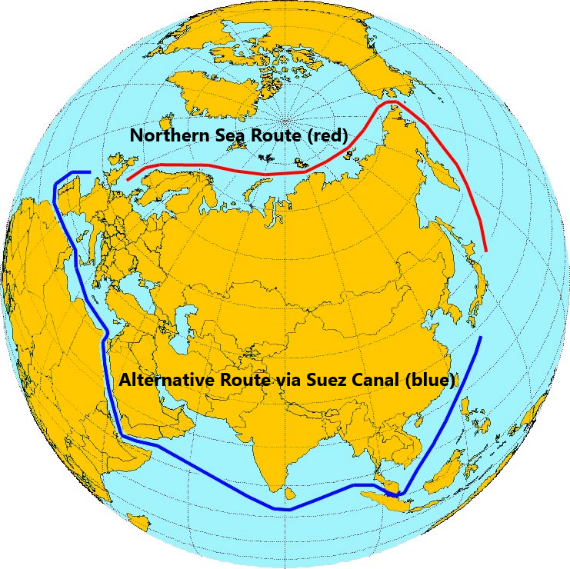
Climate Change’s Impact on Arctic Northern Sea Route May Magnify Future Conflict in Asia
By Katherine Weingartner WiSe Fellow
As melting ice opens up new shipping pathways in the Arctic, there has been great interest in strengthening trade between Russia and other Asian nations such as China and Japan through the Arctic’s Northern Sea Route (NSR). However, given the high tensions over territorial disputes in the East and South China Seas, increased shipping in these areas through the NSR could pose enhanced security risks. It is critical to understand how climate change in the Arctic has the capacity to intensify security issues in other parts of the world in order to mitigate potential future conflict.
The rapid melting of Arctic sea ice due to climate change is opening up new opportunities for Arctic marine navigation, including via the Northern Sea Route (NSR) which links the Atlantic and Pacific regions along Russia’s coast. Compared to the Suez and Panama Canal routes, utilizing the NSR could reduce transport distance by as much as 50 percent from northern Europe to northeast Asia and northwest North America. Estimates show that by mid-century (2040-2059), the Arctic’s total navigation potential could rise significantly and by the end of the 21st century, the time window for allowing transit along the NSR could increase by four to 6.5 months. Although many challenges remain to increasing the use of the NSR, including environmental and marine safety concerns as well as difficult navigation under Arctic sea conditions, the opening of the NSR is still creating economic and strategic interest in greater NSR transit, most notably in Asia.
There are many advantages that the NSR could offer to Asian countries. The prospect of greater use of the NSR is strengthening Japan-Russian cooperation to bolster economic benefits for both countries. In particular, as the largest importer of liquefied natural gas in the world, Japan sees great opportunity in receiving these imports from Russia’s Yamal Peninsula and other closer sources through the quicker NSR. In the aftermath of President Xi Jinping’s 2013 rise to power in China, Sino-Russian economic ties have also increased, especially as Russia pivots towards Asia to reduce its dependency on Western trade. Not only could the NSR allow faster and cheaper trade between China and Europe along the Russian coast, but by diversifying its trade routes, China can expand its access to natural resources to support greater economic growth which includes large-scale natural gas deals with Russia. Furthermore, by adding this additional route, less Chinese trade would need to go through the Straits of Malacca which is vulnerable should conflict erupt in the South China Sea. Several other Asian countries, such as South Korea and Singapore, also have a vested interest in the NSR and advanced Arctic development. However, the possibility of increasing shipping via the NSR by these Asian countries could come with adverse effects.
Increasing commercial activity along the NSR may magnify already existing territorial tensions in the South and East China Seas between China and its neighbors. China and Japan continue to dispute the sovereignty of certain uninhabited islands in the East China Sea, a conflict that is amplified by a strong U.S.-Japanese alliance and China’s insistence that the U.S. not interfere in its affairs there. The situation is compounded by the Treaty of Mutual Cooperation and Security between the United States and Japan which states that in the event of military conflict against Japan, which includes the disputed territory, the U.S. has a duty to act. Meanwhile, competing territorial claims among China, the Philippines, Taiwan, Brunei, Vietnam, and Malaysia in the South China Sea add additional stresses in the region. Although many legal, physical, and economic barriers still exist to develop the NSR and there are international mechanisms to resolve territorial disputes, they may not be sufficient to mitigate potential rises in security risks from greater NSR transport. Arctic climate change impacts have the ability to affect security relations beyond the bounds of the Arctic. By recognizing that increased transportation via the NSR in contested waters in Asia has the possibility of intensifying security risks in the region, actions can be taken to mitigate the compounding effects of climate change on already existing conflicts.
Katherine Weingartner is a WiSe Fellow and program consultant at ICF, a global consulting firm that works in environmental and security issues. Ideas expressed are the author’s and do not necessarily represent the views of ICF.





